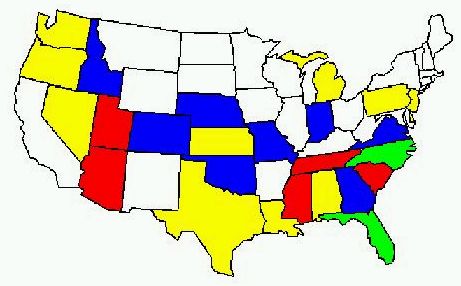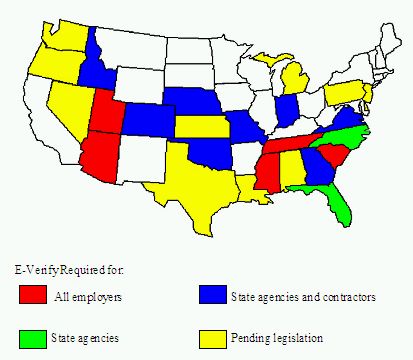On May 26, 2011, the U.S. Supreme Court, by a 5-3 vote, upheld
the Legal Arizona Workers Act (LAWA) in Chamber of Commerce v. Whiting, 563 U.S.
___ (2011). Based on the high court's decision, state
governments may mandate the use of E-Verify and may penalize
employers that hire undocumented workers, such as by revoking state
business licenses.
The Supreme Court's decision in Chamber of Commerce v. Whiting,
which affirmed the validity of the Arizona statute, has set the
stage for other states to follow quickly in Arizona's
footsteps. Currently, Arizona is one of several states, shown below
in red, mandating E-Verify for all employers. Others are sure to
follow.

Legal Arizona Workers Act
By way of background, in 2007, Arizona enacted the controversial state law that requires all employers in Arizona to use E-Verify (the Department of Homeland Security's electronic verification system for employment eligibility), in addition to the standard paper I-9 process, to confirm that newly hired workers are legally authorized to work in the United States.
In addition, the Arizona statute provides that employers within Arizona who knowingly or intentionally employ unauthorized aliens may have their business licenses suspended or revoked – the proverbial "death penalty" for businesses.
In response to the Arizona legislation, the U.S. Chamber of Commerce and a number of civil rights organizations filed suit against the state of Arizona arguing that LAWA was unconstitutional. Among other things, the plaintiffs argued that LAWA was preempted by federal immigration law and that immigration legislation was strictly the province of the federal government. Further, the plaintiffs argued that Arizona had no authority to mandate the use of E-Verify when the program was voluntary at the federal level. However, the district court, the Ninth Circuit Court of Appeals, and now the Supreme Court, all ruled in favor of Arizona and held that LAWA was not preempted by federal law and that Arizona's statute is indeed constitutional.
The Map: Present and Future State Immigration Laws
Although E-Verify is mandatory in Arizona and several other states, the E-Verify program generally remains voluntary at the federal level; however, by Executive Order, federal contractors are required to use E-Verify for all new hires and employees assigned to the federal contract. Click here for additional information regarding E-Verify.
After Arizona passed LAWA, a number of other states followed with their own legislation targeted at prohibiting the unlawful employment of undocumented workers within those states. Some have required the use of E-Verify for all employers, whereas others have required it only for state agencies and contractors of state agencies. Other states have presumably been waiting in the wings to see how the Supreme Court would rule on the constitutionality of LAWA before implementing their own similar state laws. As a result of the Supreme Court's decision upholding the Arizona statute, we expect a number of additional states to enact similar statutes across the country; indeed, such legislation currently is pending in a number of states.
In short, now that the Supreme Court has spoken, it is time for employers to take heed. It is imperative for employers to be knowledgeable of the state laws where they conduct business as well as to keep abreast of pending legislation regarding mandatory use of E-Verify and other employment verification requirements. To ignore such requirements may ultimately lead to the "death penalty" - the suspension or revocation of state business licenses.
Currently, the landscape of mandatory use of E-Verify can be broken down to those states that require E-Verify for all employers (red), those states that require E-Verify for state agencies and those contractors and sub-contractors who perform work for state agencies (blue), and those states that require E-Verify for state agencies only (green). We anticipate that this map will change rapidly as more states follow Arizona's lead on the heels of the Supreme Court's decision. Those states without a comparable statute will likely consider enacting legislation. Other states may expand current law to increase the requirement to cover all employers.

In addition to being cognizant of the states that require
E-Verify usage and to comply with any such statutes, employers must
also ensure that their paper I-9 files are in order.
The content of this article is intended to provide a general guide to the subject matter. Specialist advice should be sought about your specific circumstances.


